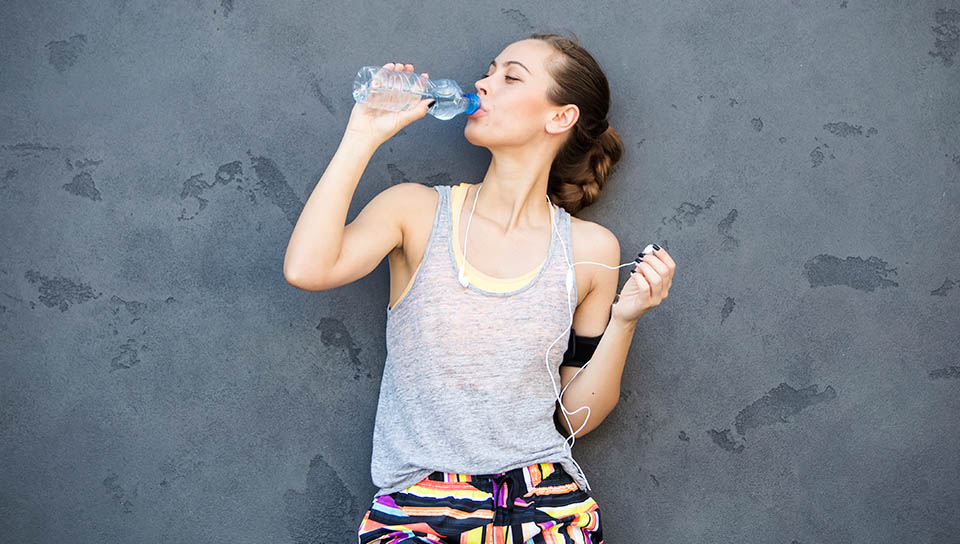The importance of staying hydrated
Sep 15 2020


Being well-hydrated is essential for the basic physiological functions of your body, such as digestion, kidney function, detoxing, regulating blood pressure, and regulating body temperature.
Hydration is a major current health topic, and yet, many people fail to meet the daily recommended fluid intake.
Doctors try to make it easy for us. Adult women are advised to drink 8 glasses of water daily, and adult men are advised to have 10 glasses. It’s similar with children: the daily fluid intake for girls is just under 8 glasses (1.9 liters), while boys should drink just over 8 glasses (2.1 liters).
But since adults vary in size, some have decided to adopt this formula for a simple, more tailored answer:

This formula allows for a more precise recommendation of fluid intake for adults, though it’s important to consider many other factors: the temperature, the amount of physical activity, gender, age, and, for women, whether they’re pregnant or nursing.
When it comes to young children, the formula is a bit more complex and should be monitored by their pediatrician since, normally, the recommended fluid intake for children (in relation to body weight) is much higher than it is for adults.
IT’S NOT JUST ABOUT WATER
Around 80% of our daily hydration should come from different types of fluids, while 20% should come from food. However, it’s not just about the amount of fluids; the quality of those fluids is important, too. A healthy drink is one that hydrates and provides nutrients without adding too many extra calories to your daily diet. Water is important, of course, but there’s also tea, soups, electrolyte drinks, etc.
HYDRATING WHILE PREGNANT OR NURSING
These are two stages during which we should be even more mindful about hydrating, since water is indispensable in producing the amniotic fluid that surrounds and protects the fetus and in producing enough healthy breast milk in the mother. This, coupled with the fact that vomiting in the first few months of pregnancy can cause major loss of fluids, is why pregnant women are advised to add another 1.5 glasses of water to their daily fluid intake, while women who are nursing should have from 2.5-4 extra glasses daily.
FOR YOUR KIDNEYS
At least 60% of the human body is composed of water, and the kidneys are responsible for processing it to ensure you get all its benefits. If your kidneys have no water to work with, they can start failing.
If your urine is dark (it should be very clear), remember to drink the right amount of water. Proper hydration reduces the risk of kidney failure.
HYDRATION AND WORKING OUT
Physical activity increases your body temperature and can cause a massive loss of fluids through perspiration. If dehydration is significant and constant, the chances of kidney failure increase, and in extreme cases, this can be life-threatening.
It’s important to hydrate before, during, and after working out. Bear in mind that the loss of fluids due to sweating during an intense workout can be like losing 4-8 glasses of water.
THIRST AND OTHER SYMPTOMS
For years, many people believed that as long as you didn’t feel thirsty, you were well-hydrated. We now know that this isn’t always the case. Although for most healthy people, a normal amount of thirst ensures proper hydration, and moderate thirst is an indicator of mild dehydration, there are instances, however, where the symptom of thirst isn’t as clear, as is the case with elderly adults, who are especially prone to dehydration simply because they don’t feel thirst the way they did before.
HYDRATION AND MENTAL PERFORMANCE
While there isn’t much research into the correlation between hydration and mental performance, studies show that dehydration is detrimental to mental performance as far as psychometrics, motor control, mental dexterity, and cognition.
DEHYDRATION AND OTHER HEALTH PROBLEMS
There is evidence that suggests even mild chronic dehydration can lead to greater health problems, such as constipation, hypertension, stroke, dental issues, kidney stones, glaucoma, lung disease, and urinary tract infections.
WATER INTOXICATION
Though we should stay hydrated, it’s important that we don’t overdo it. The extremes of fluid balance—severe dehydration and water intoxication—can cause disease and even death in both kids and adults. It’s normal to drink more water than usual on a hot day, but if you feel generally much thirstier than you usually do, it’s important to get checked by your doctor.
HYDRATION AND VITAMIN C
A healthy diet with the right amount of vitamins and minerals also helps us stay properly hydrated, especially during the summer. Vitamin C, for example, helps hydrate your body (and your skin) more efficiently. It also helps your skin by combatting the effects of free radicals and early signs of aging. A healthy amount can also help protect you from sun damage. Because of all this, it’s useful to have vitamin supplements like Redoxon® to help maintain healthy levels of Vitamin C.
HELPFUL TIPS FOR EVERYONE
There are many myths and contradictions about fluid intake; however, experts agree on a few helpful tips, which would be good to remember:
- Don’t wait for dehydration symptoms to appear before you start taking steps to hydrate. Prevent them by drinking enough water.
- Signs of dehydration include infrequent urination, darker urine than is normal, dry mouth, drowsiness, fatigue, thirst, headaches, confusion, dizziness, and fainting.
- Don’t rely on feeling thirsty, as that doesn’t always guarantee proper water intake.
- Foods such as fruits, vegetables, and soups can also help contribute to the daily recommended fluid intake.
- During the summer, it’s important to take extra measures both for hydration and to prevent conditions such as diarrhea and gastroenteritis, which are most common between the months of March and September.
- Those with higher risk of developing the above conditions are children aged 5 and under, the elderly, and people who struggle with obesity.
REFERENCES
- American Academy of Family Physicians. (2017). Hydration: Why it’s so important. Retrieved from https://familydoctor.org/hydration-why-its-so-important/
- Gon. (2017). Cómo hidratar la piel desde dentro. Retrieved from https://worldhealthdesign.com/hidratacion-de-la-piel-por-dentro/
- Kolasa, K., Lackey, C., & Grandjean, A. (2012). Hidratación y promoción de la salud. ILSI de México. Retrieved from http://ilsi.org/mexico/wp-content/uploads/sites/29/2016/09/Hidrataci%C3%B2n-y-Promoci%C3%B2n-de-la-Salud.pdf
- Secretaría de Salud. (2015). La adecuada hidratación del cuerpo ayuda a una buena salud. Retrieved from https://www.gob.mx/salud/articulos/la-adecuada-hidratacion-del-cuerpo-ayuda-a-una-buena-salud
- Soteras, A. (2018). Congreso de la Hidratación: Las recomendaciones sobre ingesta de agua no se cumplen. Retrieved from https://www.efesalud.com/congreso-hidratacion-recomendaciones-agua/
- Zuñiga, O. (2014). Suplementos básicos para mantener tu piel hidratada y sana. Mejor con Salud. Retrieved from https://mejorconsalud.com/suplementos-basicos-para-mantener-tu-piel-hidratada-y-sana/








